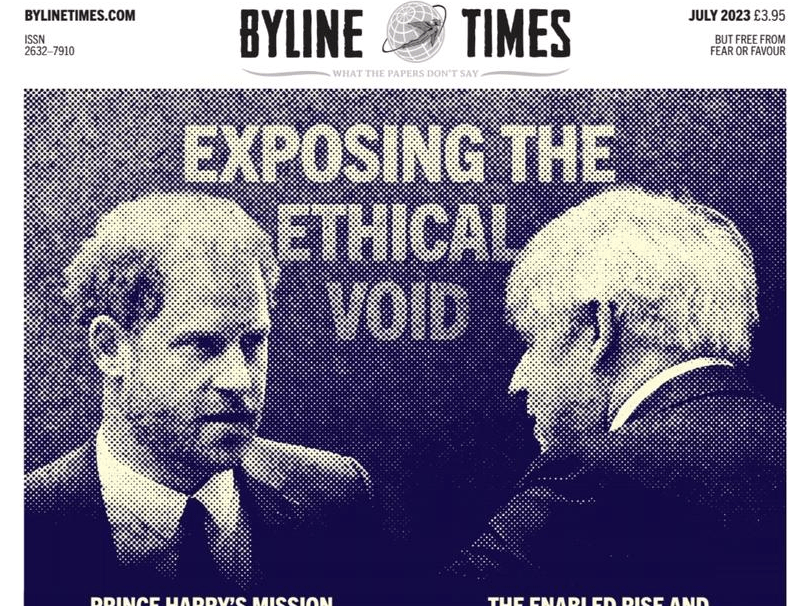
Alternative news outlet Byline Times has hit back at the suggestion from Dan Wootton that it is a “hard left blog” as it publishes yet more allegations about the GB News presenter.
Peter Jukes, co-founder and executive editor of the website and monthly newspaper, tells Press Gazette: “We are not politically aligned. I believe in liberal democracy and transparency and we don’t like corruption. We have writers I don’t agree with, like Peter Oborne, and we had a former Trident submarine commander writing for us. We are not ideological.”
He says the site is nothing like Skwawkbox, a site broadly aligned with the Corbynite wing of the Labour Party, and said that instead it drew readership from supporters of all the main UK political parties.
Byline markets itself as an independent alternative to established publishers like The Sun, Telegraph and Daily Mail – which it sees as oligarch-owned. Its editorial focus is set out in the homepage sections of:
- Identity, Empire and the Culture War
- Crisis in British Journalism
- War in Ukraine
- Climate Emergency
- Russian Interference.
Jukes is a former TV drama writer who moved into journalism after using crowdfunding to support his live-tweeting of the entire News of the World criminal hacking trial over eight months in 2014/2015.
He launched Byline Times along with former marketer Stephen Colegreave in 2019 after taking over the crowdfunded journalism website Byline.com in 2016.
They concluded that crowdfunding was not a sustainable way to fund publishing on a long-term basis and instead hit on a rather back-to-the-future approach.
In 2019 they launched Byline Times as a monthly newspaper with an associated website (most Byline content is print-only). There is also a separately owned sister website called Byline Investigates which is run by former News of the World journalist Graham Johnston (who also carried out paid investigative work for Prince Harry’s legal team in his privacy action against the Mirror).
Today Bylines Times has around 29,000 paying subscribers (15,000 in print and another 14,000 taking the digital PDF version).
Byline Times supplements its income with crowdfunding and further payments from supporters and members. According to Jukes it is turning over around £1m per year and has a full-time editorial staff of five supplemented by 15 regular columnists and a roster of freelances which goes into the hundreds.

Dan Wootton investigation
Former News of the World journalists Tom Latchem and Dan Evans are said to have been investigating Dan Wootton (who is another former News of the World staffer) for three years on a voluntary basis and set up a separate Byline crowdfunding appeal last week. So far it has raised some £52,000, after increasing its initial target from £35,000 to £75,000. The Byline Times site states that the are extending their investigation given the volume of information they are looking at in the Wootton case and in others involving “apparent media abuse”.
Wootton has meanwhile raised £37,000 to fund a possible legal action against Byline Times which, if successful, could place a colossal financial burden on the site given the seriousness of the allegations it is making. Freelance journalist Carole Cadwalladr is facing a £1m bill for costs after being sued by Brexit-backing businessman Arron Banks after making allegations about his links with Russia.
Heavyweight London law firm Mishcon de Reya is acting for Wootton and is reported to have sent legal letters to some media outlets cautioning them against repeating the accusations in Byline’s reports. But no writs or pre-publication injunctions (possible in privacy cases) have yet been served against Byline.
Byline’s Dan Wootton reports began a week after extensive coverage across the media of claims about the conduct of a unnamed BBC presenter, later identified as Huw Edwards.

Why have publishers written about Huw Edwards and not Dan Wootton?
The Guardian is the only publisher so far to take up Dan Wootton story (other than those who have reported on his denials).
Jukes admits that legal considerations are likely a big part of the reluctance of other news publishers to investigate Wootton, given Byline’s reporting is based on testimony from numerous confidential sources and the claims made are highly defamatory. There is also the fact that Edwards is a far more famous figure than Wootton.
Wootton has also not been charged with any criminal offence, which again makes reporting of any criminal allegations inherently risky.
Actor Noel Clarke is seeking £10m in damages from The Guardian over its award-winning investigation into allegations of sexual misconduct by him made in 2011. Although The Guardian’s investigation did not lead to any criminal charges it has resulted in the end of Clarke’s acting career prompting him to claim special damages for loss of work.
Jukes believes there is also an element of reluctance from the national press to investigate one of their own as enthusiastically as they would a leading figure at the BBC. Wootton is a former showbiz editor of The Sun and writes a column for Mail Online.
Both News UK and the Mail have said they are looking into the Wootton allegations. Some of Byline’s reporting also relates to workplace matters during the period Wootton was employed by News UK.
Wootton’s (at least) weekly column for Mail Online has not appeared since 30 June.
In 2017 Wootton picked up the showbiz prize at the British Journalism Awards for work which included interviews with Ant McPartlin about his struggles with addiction and mental health.
Byline Times: A print journalism success story
Over four articles Byline has written in depth with allegations about Wootton’s workplace behaviour at The Sun and other claims that centre around cash for sex videos and the use of an online alter ego.
Asked about the threat of legal action, Jukes emphasises that Byline is confident about its reporting and notes that it has handed a 28-page dossier of evidence to the Met Police, with 12 more pages set to come. Wootton has not been arrested or charged with any offence as far as Press Gazette is aware.
In an opening monologue to his GB News show broadcast last week Wootton addressed the allegations made against him head on and admitted to “errors of judgement in the past” but said “the criminal allegations against me are simply untrue”.
Wootton said he was the subject of a “smear campaign” by “nefarious players with an axe to grind” and “dark forces” who wish to destroy him and silence right-leaning GB News for political reasons.
Meanwhile Byline Times itself appears to have been on receiving end of attention from dark forces. Jukes says he has received telephone threats, there was an email hacking attempt against Byline, an email threat and a Byline Times journalist has had a substance which appeared to be blood smeared on their car windscreen.
Meanwhile, the Wootton coverage has led to a spike in print subscriptions for Byline and a healthy boost to website traffic, with more than one million page views in the past week.
There is no advertising on the Byline Times website or print edition, so – in business terms – the website serves as a marketing funnel for print subscriptions. It also offers subscriptions to a TV service called Byline TV+ for £3 per month.
Byline Times is printed under contract by regional press giant Newsquest and Jukes claims they are the only title they work with whose order keeps going up every month.
It’s a publishing success story that Jukes describes as a happy accident, with the idea of a print edition born out of the Byline Festival – an annual event he helped launch in 2017 to promote independent journalism and free speech.
Jukes says: “It’s like vinyl. It’s a thing people can buy and people like things. They can share it and people just like the idea of a newspaper.”
Email pged@pressgazette.co.uk to point out mistakes, provide story tips or send in a letter for publication on our "Letters Page" blog
